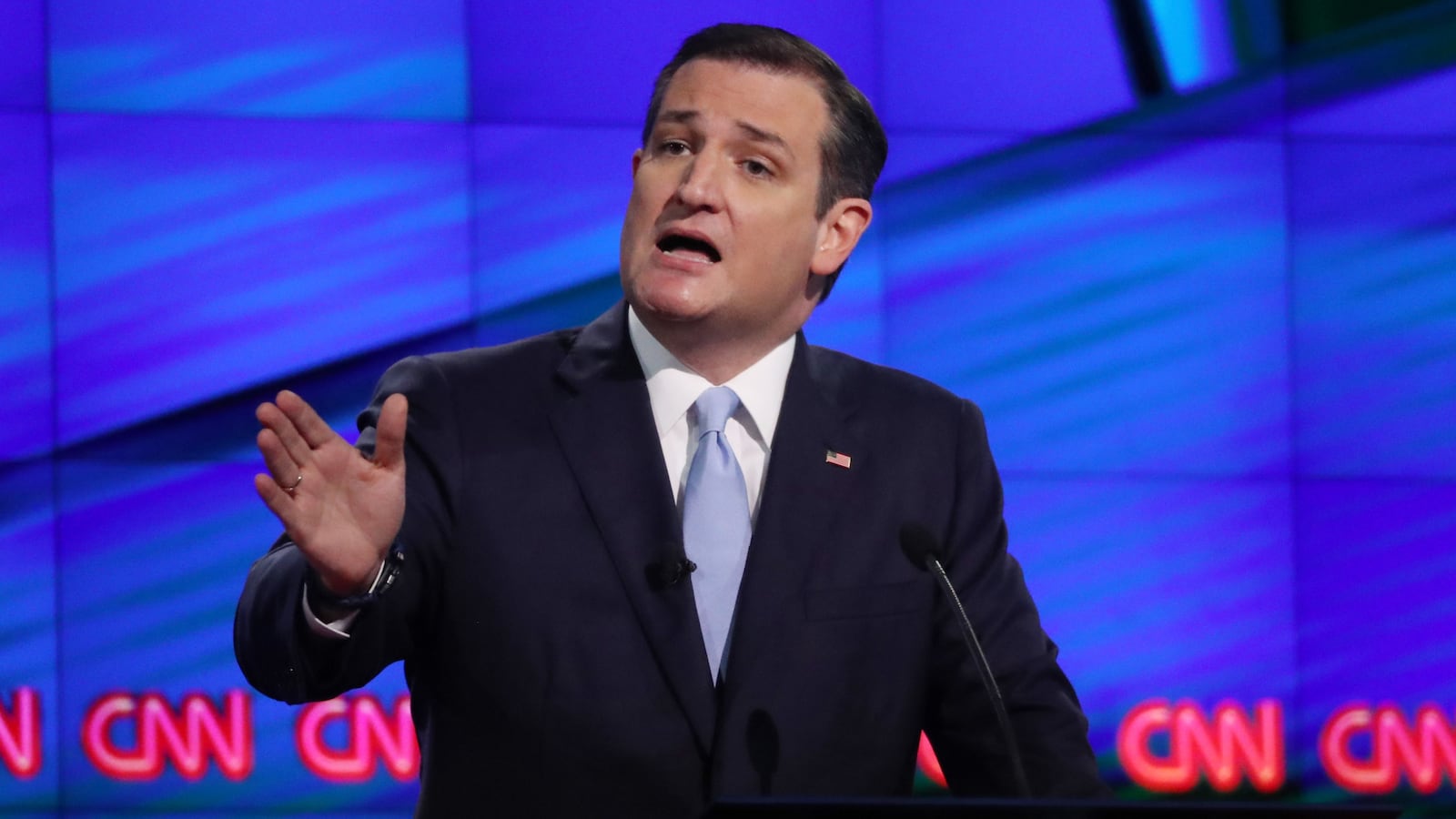In planning Thursday night’s Republican presidential debate in Miami, someone obviously decided that, when the four remaining candidates were asked about immigration, it was going to be with a totally different focus.
In the 11 previous Republican match-ups, the candidates were asked what they would do to control illegal immigration. Build a wall on the U.S.-Mexico border? Find other ways to enhance border security? And what should we do about the estimated 11 million illegal immigrants in the United States?
In this latest debate, the questions were designed to figure out how the candidates would improve the way that the United States handles legal immigrants. As anyone who follows the immigration debate can tell you, that’s a change for the better.
For one thing, if Americans don’t learn better ways to manage legal immigration correctly, we’re certain to have more illegal immigration. That’s because individuals who can’t come legally will, if they’re desperate enough, come illegally.
Then there’s the fact that the number of legal immigrants in the United States dwarf their undocumented brethren. In 2013, the Brookings Institute estimated that there were more than 40 million foreign-born residents of the United States.
Finally, the debate over illegal immigration can get heated and devolve into name calling and grandstanding. Discussions about legal immigration tend to take place on a more even keel.
And that’s pretty much what happened when the candidates were asked a brief series of questions about whether legal immigration takes jobs from American workers, whether it was time to limit the number of green cards for foreigners, and whether America in the 21st Century produced enough jobs for low-skilled workers. While Kasich and Cruz snuck in a few words about how they would combat illegal immigration, Rubio and Trump stuck to discussing how to deal with the legal variety.
Washington Times Reporter Stephen Dinan asked Kasich if he saw any merit in Trump’s proposal to place a one-year to two-year moratorium on issuing green cards to foreign workers.
Kasich doesn’t think green cards are the problem, insisting that “immigration is something that brings youth and vibrance and energy to our country.” And while we have to control our borders, he said, we should also have guest workers who “come in, work, and go home.” Finally, for many of those illegal immigrants who are already here, Kasich envisions a “path to legalization (but) not to citizenship.”
If you’re thinking that sounds like comprehensive immigration reform, you’re right. In fact, it’s very similar to the notorious “Gang of Eight” Senate bill that Rubio co-sponsored and got pilloried for by the Republican electorate.
Of course, when your name is “Kasich” and not “Rubio,” you have the luxury of freely saying such things on national television without getting racist hate mail like Rubio received during the Senate debate telling him—as I was informed one of the Cuban-American senator’s top aides—to “go back to Mexico.”
Then Dinan turned to Cruz. Noting that the United States allows in about a million permanent legal residents annually and imports thousands of guest workers, he asked the Texas senator what he thought the right level should be.
Cruz ducked the question and instead spoke in generalities about how “we need to redefine our legal immigration system so that it meets the needs of the American economy.” Claiming that “we’re bringing in far too many low-skilled workers” and that this serves to drive down “the wages of hard-working Americans,” Cruz insisted that the legal immigration system was broken.
Then the senator shifted to the hot-button issue of what to do about illegal immigration, where he had firmer footing. Build a wall, he said. Triple the border patrol, he advised. Zeroing in on so-called sanctuary cities, Cruz also threatened to “cut off federal taxpayer funds to any city that defies federal immigration laws.” Oh yeah, and, he said finally, we have to “end welfare benefits for anyone who is here illegally.”
That last action item won’t take long; illegal immigrants can’t get welfare. Cruz’s other ideas aren’t much better. I’ve known the senator for a dozen years, and he’s a friend. He’s a smart guy—except when he is talking about immigration.
For one thing, as has been noted by Princeton University Sociologist Douglas Massey and others who studied the border, walls don’t just keep some people out, but also pen other people in. Illegal immigrants won’t self-deport if they’re skeptical about their ability to return, so they’re likely to just stay put. The more walls we build, the more the immigrant population will swell. That’s what happened in the 1990’s when President Clinton cracked down on the border, and it’ll happen again.
Tripling the border patrol is an even crazier idea. Why doesn’t Cruz leave the Senate, or these days the campaign trail, and visit the border now and then? Why not do what I’ve done numerous times and ask border patrol agents and their supervisors what they would like from taxpayers?
Surprise. It’s not more agents in green uniforms. The agency can barely train and station the agents it already has. Currently, there are more than 20,000 border patrol agents on the job. Cruz wants to go to 60,000—or roughly six times the size of the Federal Bureau of Investigation.
What does the border patrol want? Three things: tunnel detection equipment; new and better roads; and more sophisticated electronic monitoring devices and smart border technology. That’s not as sexy as walls and border patrol agents but it is more likely to make a difference.
As for sanctuary cities, there is no such thing. That’s political fiction, advanced by the right because conservatives use it as a rallying cry and by the left because lowly city councils in liberal cities want to delude themselves into thinking they have the power to thwart the mighty federal government. They don’t. There is no city in America where, for instance, federal tax law doesn’t apply. Same goes with federal immigration law. If Immigration and Custom Enforcement wants you, it’s going to get you no matter where you live. Period.
Finally, Rubio chimed in, urging that we “move to a merit-based system of immigration.” He said the United States should be asking immigrants who seek to come to the United States a series of questions: “What skills do you have? What business are you going to open? What investment are you going to make? What job are you going to be able to do when you arrive in the United States?” Make it more like a job interview. Fair enough.
Notice something? On immigration, the most honest, nuanced and thoughtful answers came from Rubio and Kasich, the candidates who trail in this race. Meanwhile, Cruz and Trump—who lead in the competition for delegates—are pushing immigration policies that are naive, unrealistic, and clearly designed to pander to emotional and low-information voters who think that wishing something is enough to make it a reality.
This sums up the problem with the Republican Party’s stance on immigration. It’s not that it's real tough. It’s that it doesn’t fit in the real world.






